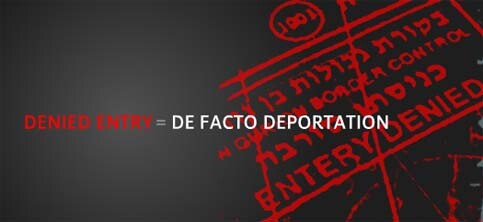IRIN 7 November 2006

A campaign image from The Campaign for the Right to Entry/Re-entry to the Occupied Palestinian Territory.
A thousand West Bank Palestinians holding foreign passports have been expelled from their homes and thousands more face a similar fate after Israel tightened its visa regime, according to Palestinian campaigners.
“After being married for 31 years, I face today a compulsory divorce as the Israeli government has refused to renew the visit visa of my wife who holds a US passport,” said Dr Adel Samara from Ramallah.
Under the new policy, tourist visas are no longer being issued to foreigners. Up until March this year, Palestinians holding foreign passports had previously been renewing their three-month tourist visas, rather than go through the long and uncertain process of applying for residency permits from the Israeli government. Now, eight months on, the full impact of this policy is being felt.
“I lived with my wife Inaya for more than three decades in Ramallah, during which she travelled 75 times outside the Palestinian territories to renew her visa and enter again. She renewed her [temporary] residency 125 times, and the last was renewed on 20 May. The Israeli authorities refused to renew her visa and forced our family to separate,” said 62-year-old Samara.
The US government estimates that there are about 35,000 Palestinians with US nationality living in the West Bank at any one time, and campaigners say a further 10,000 Palestinians with other foreign passports live there. They now face separation from their families.
“The Israeli policy will cause separation for thousands of Palestinian families in which one of the parents holds a US passport,” said Basil Ayish, coordinator of the Right of Entry and Re-Entry to the Occupied Palestinian Territories campaign, which was launched five months ago when the effects of Israel’s policy became clear.
“Entry Prohibted”
The campaign’s research indicates that Israel has refused to renew visit visas for around 1,000 Palestinians holding US and other foreign passports over the past eight months. Their passports were stamped with the words ‘Entry Prohibited’.
“The Israeli Interior Ministry and the Israeli-run West Bank civil administration did not officially announce this change in their policy, so these people where shocked when they knew about this soon after they reached the borders,” said Ayish.
“Thousands of people are now stuck in Jordan or [other] countries that offered them [visas for] their nationality. They are separated from their families, jobs and properties. Others fear to leave to avoid the same destiny and decided to stay with their families in the Palestinian territories even after their visit visa was expired. The Israeli authorities consider their stay illegal and they will be expelled soon after they are discovered,” he added.
The campaign has brought the matter to the attention of the US Secretary of State Condoleezza Rice.
“The US government is committed to ensuring that all American travellers receive fair and equal treatment. During her recent visit, the secretary [of state] raised our concerns with the appropriate officials from the Israeli government. We are following this issue closely,” said a spokesman for the US Consulate General in Jerusalem.
The new regime also affects westerners and other foreigners working or volunteering in the West Bank.
No change in policy
However, Sabine Haddad, spokeswoman for Israel’s Interior Ministry, claimed that the Israeli government was merely implementing an existing policy.
“There’s no change in the policy - it has always been the same. It says that when a foreigner comes to the border and says he only wants to go to the area controlled by the Palestinian National Authority, he needs a permit, which he can get from the Israeli Army or through the Palestinian Authority,” Haddad said.
“Over past years we and the army did not really pay attention to this policy. But a few months ago we met with the army and the Ministry of Justice and we decided to act on this policy,” she added.
Haddad said the policy applied to all foreigners, and not just Palestinians with foreign passports.
“There is no difference if the foreigner is of Palestinian origin or not of Palestinian origin. There are lots of British and American people who say they are coming to Israel as tourists and then they don’t spend any time in Israel and go to the West Bank. There were more and more of these people,” she said.
Families prevented from reunification
The Israeli government has also frozen family reunification applications between Palestinian residents of the West Bank and their spouses from abroad - many of whom are now facing expulsion.
Since the beginning of the second intifada (uprising by Palestinians against the Israeli occupation of the West Bank and the Gaza Strip) in 2000, Palestinians have submitted 120,000 requests for family unification, which Israel has refused to process, citing unspecified security reasons.
The Israeli human rights group B’tselem said the suspension meant that some children would have to be raised by a single-parent, and that tens of thousands of women would be living on the West Bank illegally and in fear of deportation.
“International law affirms families’ rights to be united,” said Sleiman Shaheen, legal consultant at Al-Quds Center for Legal Assistance and Human Rights.
“This case appears legal from outside but, in fact, it is political. Israel is adopting this policy for demographic reasons and it is a kind of collective punishment against inhabitants of the occupied areas.”
This item comes to you via IRIN, a UN humanitarian news and information service, but may not necessarily reflect the views of the United Nations or its agencies. All IRIN material may be reposted or reprinted free-of-charge; refer to the copyright page for conditions of use. IRIN is a project of the UN Office for the Coordination of Humanitarian Affairs.
Related Links